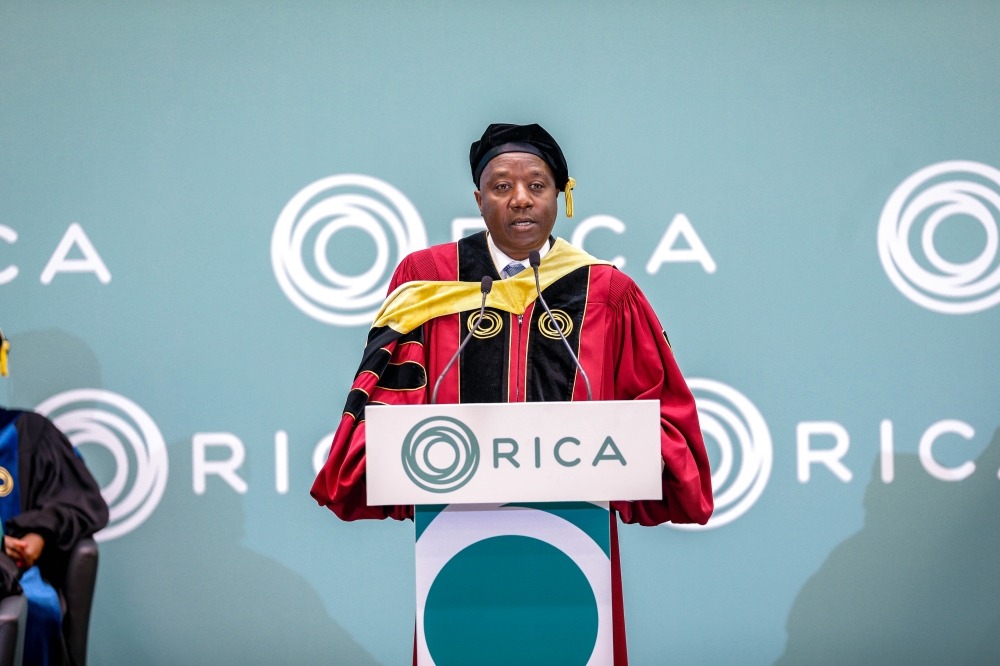

Prime Minister Edouard Ngirente has said Rwanda Institute for Conservation Agriculture (RICA) encourages youth to engage in farming, or agriculture, a sector largely characterised by an aging population.
The premier made the observation on September 20 in Kigali, at the RICA Graduation Ceremony for the class of 2024 – which comprises 81 graduates, 44 young women and 37 young men. They include 13 who specialised in animal production systems, 26 in crop production systems, 22 in food production systems, and 20 in irrigation and mechanisation systems.
"In a continent facing the challenges of an aging farming population, RICA serves as a symbol of hope, inspiring youth to pursue careers in agriculture,” he said.
ALSO READ: Rwanda bets on agriculture institute to drive up innovation
According to the UN Food and Agriculture Organization (FAO), the average age of farmers in Africa was about 60 [as of 2019], although 60 per cent of the continent’s population was under 24 years of age.


For Rwanda, FAO data shows that as of May 2022, the average age of farmers in the country was 44 years.
Ngirente pointed out that it is important that RICA continues "to maintain its reputation as an institute of excellence, attracting outstanding students through transparent selection processes and providing exceptional training.”
This dedication, he said, will ensure that RICA remains competitive and continues to produce skilled graduates who will drive innovation and sustainability in agriculture.
Addressing the graduates, Ngirente said "I have no doubt that you are well prepared and equipped with relevant skills and knowledge to make significant contribution to the agriculture sector in our country and overall national development.”
"I encourage you to be innovative, creative, entrepreneurial and always support smallholder farmers in increasing agricultural production while ensuring sustainable land management practices,” he told the graduates, commending them for hard work, determination, and resilience in completing their studies in key specialisations.
ALSO READ: Making agriculture ‘cool’: Five things that distinguish RICA
Rooting for conservation agriculture
The importance of conservation agriculture in achieving sustainable development cannot be overstated, Ngirente said.
As outlined in Vision 2050, he pointed out, Rwanda is committed to investing in modern agricultural practices to improve efficiency and sustainability in food production.
The establishment of RICA to train professionals who can implement sustainable farming practices, improve food security and climate resilience, is commendable, the premier remarked.
"This second graduation of RICA is a proof that Rwanda will not only address the issue of lack of knowledge and skills among farmers but also improve farming techniques, and ultimately leading to greater food security,” he observed, reiterating the government’s commitment to fostering a supportive environment for conservation agriculture and innovation.
Rehemah Mutoni who specialised in animal production, gave an instance of what the graduates learned that can offer a solution to communities in line with agriculture sector development.
She cited "sustainable agriculture that allows farmers to get the highest yield possible, but still conserving the environment that is around us.”
She indicated that sustainable agriculture involves principles that include conserving the soil through minimal tillage, putting crop covers, as well as diversifying crops to improve soil health.
"As graduates, we are coming up with different enterprises that include food processing, animal production, irrigation systems, and crop production. And through these different enterprises we have done activities that enable us to have these skills that we are going to be able to instil in different projects and jobs that we are going to acquire. And this is all in effort to improve Rwandan agriculture and productivity but also while catering for the soil health and the environment,” she said.
RICA Vice Chancellor Ron Rosati told the graduates that the knowledge and skills they gained prepared them to tackle some of the most pressing global challenges—food security, environmental conservation, and economic development.
"You are now the champions of conservation agriculture, and Rwanda’s future depends on your leadership. It is your responsibility to ensure that the nation continues to grow, particularly through sustainable agricultural practices,” he said.
"Today, we proudly honor the second graduating class. One key milestone worth celebrating: 93 per cent of our first graduates [75 who graduated in August 2023] are now professionally employed or pursuing graduate studies. This is a powerful testament to the quality of education you have received and a beacon of confidence for your future success,” he stated.


